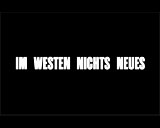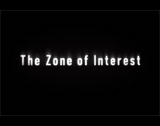
|
Greatest War Movies 2020s |
| Film Title/Year/Director, War-time Setting and Brief Description | ||

|
All Quiet on the Western Front
(2022, Germ.) (aka Im Westen nichts Neues)
Co-writer/director Edward Berger's bleak war epic illustrated the senseless and violent effects of war on youth. The anti-war film told about the devastating effects of the Great War through the eyes of a young idealistic and boyish German soldier Paul Bäumer (Felix Kammerer), who excitedly volunteered to be sent to the front's trench warfare during WWI, along with his classmate friends Albert Kropp (Aaron Hilmer), Franz Müller (Moritz Klaus), and Ludwig Behm (Adrian Grünewald). He became caught up in the patriotic fervor of his country to be a hero, but quickly became disillusioned once he found himself in the midst of death in the trenches. He was aided by the wise advice of older soldier Stanislaus "Kat" Katczinsky (Albrecht Schuch). In a second story strand, it told about the efforts of German State Secretary - politician Matthias Erzberger (Daniel Brühl) to seek peace and bring about an armistice and ceasefire between the French and German forces, although opposed by General Friedrichs (Devid Striesow) on the front lines. In the film's ending just before an armistice, in the film's most horrifying sequence, Paul was struggling with an enemy soldier in a trench located in no-man's land, and was forced to watch him slowly die after he had stabbed him. Paul's own fate came shortly later just minutes before the 11:00 peace armistice, when he was bayoneted in the back. Netflix's lengthy adaptation and remake of the 92 year-old Oscar-winning war film from director Lewis Milestone titled All Quiet on the Western Front (1930) was based upon Erich Maria Remarque's 1929 classic World War I novel. The film received four wins for Best Cinematography, Best International Feature Film, Best Production Design, and Best Original Score. Its Best International Feature Film Oscar win marked Germany's 12th nomination in the category and its third win. [Note: It was the first German-language movie to be nominated for Best Picture, and the first Best Picture nominee to be spoken almost entirely in German.] |
|

|
The Zone of Interest
(2023, UK)
British co-writer/director Jonathan Glazer's history-based, non-English language drama (his fourth film) was adapted from Martin Amis' 2014 novel of the same name, about the unseen evils and horrors of the Holocaust viewed through the everyday domestic and mundane daily life of the family of one of its main Nazi Germany officers. It was the winner of the Oscar for Best International Feature Film. The dispassionate yet highly-effective portrayal was enhanced by a haunting Mica Levi score. The observational film's opening sequence with black title screens then followed with an idyllic and peaceful family picnic scene beside a river in the year 1943. The family was headed by Rudolf Höss (Christian Friedel), his devoted wife Hedwig (Sandra Hüller), and their five children, who were attempting to attain a dream life. The shocking revelation was that Hoss was the highly-calculating, cruel commanding officer (Obersturmführer) of the Auschwitz concentration "death camp" and its wall that bordered the family's spacious home property, with visible barbed wire, a watchtower, and a chimney. To imply complicity with the horrific situation and to keep the viewing audience alert to searching for various clues to the situation, director Glazer wisely never explicitly showed anything that was happening over the nearby tall concrete wall, except for diagetic audio sounds (barking dogs, torture screams, shouting, gun fire, boot footsteps, train whistles from arriving and departing trains, humming machinery and furnace sounds, etc.) and some suggestive visual images (human ash remains in the air and in the river, light from night fires, steam from death camp trains, a collection of gold teeth, etc.) that could be interpreted in a number of ways. Hoss' dehumanizing responsibilities included overseeing plans for a new and more efficient extermination and eradication facility (gas chamber and crematorium), as he abstractly talked about "pieces," a "combustion zone," and "loads" (or "reloads") of Jewish bodies passing through the facility. Meanwhile, his stern wife Frau Hedwig Hoss, with three maidservants (prisoners), tended to her home's sprawling garden and greenhouse, outdoor swimming pool, and oversaw deliveries of seized and confiscated items from the camp's prisoners, including fur coats that she grabbed for herself. Recognition of the obvious problem nearby was evidenced by the arrival of Hedwig's mother for a visit, who promptly left unannounced in the darkness of the night. When Hoss was relocated to Berlin, Germany for a few months, Hedwig was given special permission to remain behind to continue living her dreamy, complacent and routine life in their home. When Rudolf returned, his newest commission was to transport Hungarian Jews to Auschwitz to be more efficiently exterminated. |
|

|
Blitz (2024)
Writer/director Steve McQueen's historically-based action-adventure film and war-time drama (from Apple Original Films) was a grim and harrowing tale of survival and racism during the Nazi's Blitzkrieg by its Luftwaffe in the fall of 1940 into the late spring of 1941, during which time the UK suffered massive nightly bombing raids on its industrial centers, port cities, and towns. The results were devastating for the people and property of the country, with the destruction of millions of homes, and tens of thousands of British civilians. The Nazi German goal was to strip the country of its food supplies, industrial production, munitions stockpiles, and dampen the morale of the people. In the film's plot, hard-working, doting single white British mother Rita (Saoirse Ronan), a weapons factory employee, lived in the East London (Stepney Green) home of her piano-playing father Gerald (Paul Weller), with her only child - biracial 9 year-old son George (Elliott Heffernan). Seen in a flashback, her husband Marcus (CJ Beckford) from Grenada had been arrested and deported years earlier for defending himself in a racist incident against thugs. At her place of work, with friends Tilda (Hayley Squires) and Doris (Erin Kellyman), Rita was selected to sing a song ("Winter Coat") on a visiting BBC radio show. With the help of a government-sponsored evacuation and foster-parent program, Rita reluctantly decided to have George evacuated via a train journey out of London to live with strangers in the country. The heartbroken Rita tearfully put George on a train - who coldly and angrily told her: "I hate you." During his train journey, George made the brave but risky decision to jump off, and return home on his own - back to reunite with his mother. He then jumped onto another freight train car and had a nasty altercation with three other stowaway brothers before they were all evicted. The journey of self-discovery, seen through his young POV, was difficult as he was now solely on his own. He attempted to navigate through the British countryside and the outer boroughs of London, and was forced to evade bombs, explosions, and flooding (in an underground train station). He also had to confront and experience several instances of racial prejudice. He was kidnapped by a group of heartless opportunistic looters, scavengers, and evil thieves (similar in parts to Charles Dickens' Oliver Twist), including Albert (Stephen Graham) and Beryl (Kathy Burke), who took particular advantage of the mass casualties after the bombing of a fancy nightclub full of rich patrons. George was also pressured into crawling into bombed-out jewelry stores to steal merchandise. Along the way, he was aided by dark-skinned, kindly Nigerian Air Raid Precautions (ARP) warden Ife (Benjamin Clementine). Meanwhile, Rita was notified that George went missing, and she became frantic. George was forced to grow up, learn about his own identity, and muster up courage and the will to persevere. |
|
(chronological by film title) Introduction | 1900s-1920s | 1930s | 1940s-1 | 1940s-2 | 1950s | 1960s-1 | 1960s-2 | 1970s | 1980s | 1990s | 2000s | 2010s | 2020s |